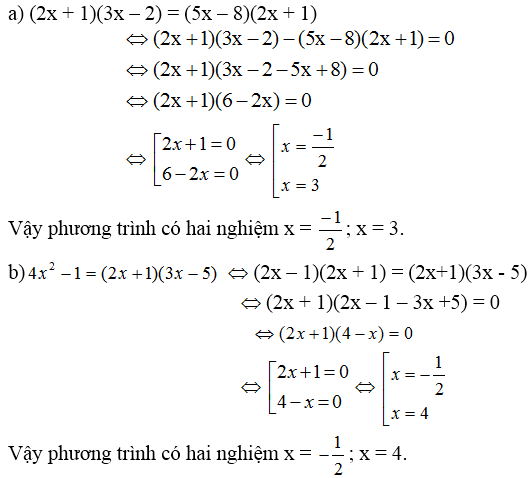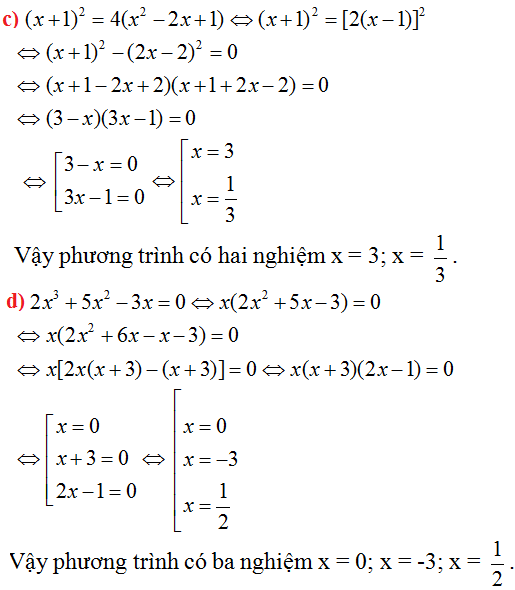Giải phương trình \(\left(x^2+3x-1\right)^2+2\left(x^2+3x-1\right)-8=0\)

Những câu hỏi liên quan
cho hàm số \(f\left(x\right)=x^3-3x^2+2\)
a, giải bất phương trình \(f'\left(x\right)\le0\)
b, giải phương trình \(f'=\left(x^2-3x+2\right)=0\)
c, đặt \(g\left(x\right)=f\left(1-2x\right)+x^2-x+2022\) giải bất phương trình\(g'\left(x\right)\ge0\)
\(a,f'\left(x\right)=3x^2-6x\\ f'\left(x\right)\le0\Leftrightarrow3x^2-6x\le0\\ \Leftrightarrow3x\left(x-2\right)\le0\Leftrightarrow0\le x\le2\)
Đúng 2
Bình luận (0)
Lời giải:
a. $f'(x)\leq 0$
$\Leftrightarrow 3x^2-6x\leq 0$
$\Leftrightarrow x(x-2)\leq 0$
$\Leftrightarrow 0\leq x\leq 2$
b.
$f'(x)=x^2-3x+2=0$
$\Leftrightarrow 3x^2-6x=x^2-3x+2=0$
$\Leftrightarrow 3x(x-2)=(x-1)(x-2)=0$
$\Leftrightarrow x-2=0$
$\Leftrightarrow x=2$
c.
$g(x)=f(1-2x)+x^2-x+2022$
$g'(x)=(1-2x)'f(1-2x)'_{1-2x}+2x-1$
$=-2[3(1-2x)^2-6(1-2x)]+2x-1$
$=-24x^2+2x+5$
$g'(x)\geq 0$
$\Leftrightarrow -24x^2+2x+5\geq 0$
$\Leftrightarrow (5-12x)(2x-1)\geq 0$
$\Leftrightarrow \frac{-5}{12}\leq x\leq \frac{1}{2}$
Đúng 1
Bình luận (0)
Giải các phương trình sau
\(1,\dfrac{3x-1}{4}+\dfrac{6x-2}{8}=\dfrac{1-3x}{6}\)
\(2,\left(2x-1\right)^2+\left(x-3\right)\left(2x-1\right)=0\)
1: \(\Leftrightarrow6\left(3x-1\right)+3\left(6x-2\right)=4\left(1-3x\right)\)
=>18x-6+18x-6=4-12x
=>36x-12=4-12x
=>48x=16
hay x=1/3
2: \(\Leftrightarrow\left(2x-1\right)\left(2x-1+x-3\right)=0\)
=>(2x-1)(3x-4)=0
=>x=1/2 hoặc x=4/3
Đúng 0
Bình luận (0)
Giải phương trình sau
1. \(5x^2-16x+7+\left(x+1\right)\sqrt{x^2+3x-1}=0\)
2. \(3\left(\sqrt{2x^2+1}-1\right)=x\left(1+3x+8\sqrt{2x^2+1}\right)\)
\(\left(\frac{2x-1}{2-x}+2\sqrt{2-x}\right)^3=27\left(2x-1\right)\)
Giải phương trình nghiệm nguyên sau:
\(3x^3-13x^2+30x-4=\sqrt{\left(6x+2\right)\left(3x-4\right)^3}\)
Giải phương trình
\(-3x^2+x+3+\left(\sqrt{3x+2}-4\right)\sqrt{3x-2x^2}+\left(x-1\right)\sqrt{3x+2}=0\)
Giải các phương trình sau:
a \(\left(x+2\right)\left(x+\text{4}\right)\left(x+6\right)\left(x+8\right)+16=0\)
b \(\left(x+2\right)\left(x+3\right)\left(x+4\right)\left(x+5\right)-24=0\)
c \(\left(4x+1\right)\left(12x-1\right)\left(3x+2\right)\left(x+1\right)-4=0\)
d \(\left(x^2-3x+2\right)\left(x^2+15x+56\right)+8=0\)
b: Ta có: \(\left(x+2\right)\left(x+3\right)\left(x+4\right)\left(x+5\right)-24=0\)
\(\Leftrightarrow\left(x^2+7x+10\right)\left(x^2+7x+12\right)-24=0\)
\(\Leftrightarrow\left(x^2+7x\right)^2+22\left(x^2+7x\right)+120-24=0\)
\(\Leftrightarrow x^2+7x+6=0\)
\(\Leftrightarrow\left(x+1\right)\left(x+6\right)=0\)
\(\Leftrightarrow\left[{}\begin{matrix}x=-1\\x=-6\end{matrix}\right.\)
Đúng 1
Bình luận (0)
giải bất phương trình\(\left\{{}\begin{matrix}\left(x^2-4\right)\left(x^2+1\right)\ge0\\\left(x+1\right)\left(3x^2-x+1\right)< 0\end{matrix}\right.\)
Vì $3x^2-x+1>0,x^2+1>0$
$\to \begin{cases}x^2 \geq 4\x<-1\\\end{cases}$
$\to \begin{cases}\left[ \begin{array}{l}x \geq 2\\x \leq -2\end{array} \right.\\x<-1\\\end{cases}$
$\to x \leq -2$
Vậy tập xác định của phương trình là `(-oo,-2]`
Đúng 0
Bình luận (1)
Giải các phương trình sau bằng cách đưa về phương trình tích :
a) \(\left(2x+1\right)\left(3x-2\right)=\left(5x-8\right)\left(2x+1\right)\)
b) \(4x^2-1=\left(2x+1\right)\left(3x-5\right)\)
c) \(\left(x+1\right)^2=4\left(x^2-2x+1\right)\)
d) \(2x^3+5x^2-3x=0\)
a)(2x+1)(3x-2)=(5x-8)(2x+1)
⇔(2x+1)(3x-2)-(5x-8)(2x+1)=0
⇔(2x+1)(3x-2-5x+8)=0
⇔(2x+1)(-2x+6)=0
⇔2x+1=0 hoặc -2x+6=0
1.2x+1=0⇔2x=-1⇔x=-1/2
2.-2x+6=0⇔-2x=-6⇔x=3
phương trình có 2 nghiệm x=-1/2 và x=3
Đúng 0
Bình luận (0)
b)4x2-1=(2x+1)(3x-5)
⇔(2x-1)(2x+1)-(2x+1)(3x-5)=0
⇔(2x+1)(2x-1-3x+5)=0
⇔(2x+1)(-x+4)=0
⇔2x+1=0 hoặc -x+4=0
1.2x+1=0⇔2x=-1⇔x=-1/2
2.-x+4=0⇔-x=-4⇔x=4
phương trình có 2 nghiệm x=-1/2 và x=4
Đúng 0
Bình luận (0)
Giải phương trình sau:
\(^{\left(x^2+1\right)^2}\)+3x\(^{\left(x^2+1\right)^2}\)+\(^{2x^2}\)=0
Sửa đề: \(\left(x^2+1\right)^2+3x\left(x^2+1\right)+2x^2=0\)
Ta có: \(\left(x^2+1\right)^2+3x\left(x^2+1\right)+2x^2=0\)
\(\Leftrightarrow\left(x^2+1\right)^2+2x\left(x^2+1\right)+x\left(x^2+1\right)+2x^2=0\)
\(\Leftrightarrow\left(x^2+1\right)\left(x^2+2x+1\right)+x\left(x^2+2x+1\right)=0\)
\(\Leftrightarrow\left(x^2+2x+1\right)\left(x^2+x+1\right)=0\)
mà \(x^2+x+1>0\forall x\)
nên \(x^2+2x+1=0\)
\(\Leftrightarrow\left(x+1\right)^2=0\)
\(\Leftrightarrow x+1=0\)
hay x=-1
Vậy: S={-1}
Đúng 1
Bình luận (0)
Giải các phương trình sau:1, dfrac{x-1}{3}-xdfrac{2x-4}{4}2, left(x-2right)left(2x-1right)x^2-2x3, 3x^2-4x+104, left|2x-4right|05, left|3x+2right|46, left|2x-5right|left|-x+2right|*Giúp mình với mình đg cần gấp ạ T_T
Đọc tiếp
Giải các phương trình sau:
1, \(\dfrac{x-1}{3}-x=\dfrac{2x-4}{4}\)
2, \(\left(x-2\right)\left(2x-1\right)=x^2-2x\)
3, \(3x^2-4x+1=0\)
4, \(\left|2x-4\right|=0\)
5, \(\left|3x+2\right|=4\)
6, \(\left|2x-5\right|=\left|-x+2\right|\)
*Giúp mình với mình đg cần gấp ạ T_T
\(1.\dfrac{x-1}{3}-x=\dfrac{2x-4}{4}.\Leftrightarrow\dfrac{x-1-3x}{3}=\dfrac{x-2}{2}.\Leftrightarrow\dfrac{-2x-1}{3}-\dfrac{x-2}{2}=0.\)
\(\Leftrightarrow\dfrac{-4x-2-3x+6}{6}=0.\Rightarrow-7x+4=0.\Leftrightarrow x=\dfrac{4}{7}.\)
\(2.\left(x-2\right)\left(2x-1\right)=x^2-2x.\Leftrightarrow\left(x-2\right)\left(2x-1\right)-x\left(x-2\right)=0.\)
\(\Leftrightarrow\left(x-2\right)\left(2x-1-x\right)=0.\Leftrightarrow\left(x-2\right)\left(x-1\right)=0.\)
\(\Leftrightarrow\left[{}\begin{matrix}x=2.\\x=1.\end{matrix}\right.\)
\(3.3x^2-4x+1=0.\Leftrightarrow\left(x-1\right)\left(x-\dfrac{1}{3}\right)=0.\Leftrightarrow\left[{}\begin{matrix}x=1.\\x=\dfrac{1}{3}.\end{matrix}\right.\)
\(4.\left|2x-4\right|=0.\Leftrightarrow2x-4=0.\Leftrightarrow x=2.\)
\(5.\left|3x+2\right|=4.\Leftrightarrow\left[{}\begin{matrix}3x+2=4.\\3x+2=-4.\end{matrix}\right.\Leftrightarrow\left[{}\begin{matrix}x=\dfrac{2}{3}.\\x=-2.\end{matrix}\right.\)
Đúng 1
Bình luận (2)
\(1,\dfrac{x-1}{3}-x=\dfrac{2x-4}{4}\\ \Leftrightarrow\dfrac{x-1}{3}-x=\dfrac{x-2}{2}\\ \Leftrightarrow\dfrac{2\left(x-1\right)-6x}{6}=\dfrac{3\left(x-2\right)}{6}\\ \Leftrightarrow2\left(x-1\right)-6x=3\left(x-2\right)\\ \Leftrightarrow2x-2-6x=3x-6\\ \Leftrightarrow-4x-2=3x-6\)
\(\Leftrightarrow3x-6+4x+2=0\\ \Leftrightarrow7x-4=0\\ \Leftrightarrow x=\dfrac{4}{7}\)
\(2,\left(x-2\right)\left(2x-1\right)=x^2-2x\\ \Leftrightarrow2x^2-4x-x+2=x^2-2x\\ \Leftrightarrow x^2-3x+2=0\\ \Leftrightarrow\left(x^2-2x\right)-\left(x-2\right)=0\\ \Leftrightarrow x\left(x-2\right)-\left(x-2\right)=0\\ \Leftrightarrow\left(x-1\right)\left(x-2\right)=0\\ \Leftrightarrow\left[{}\begin{matrix}x=1\\x=2\end{matrix}\right.\)
\(3,3x^2-4x+1=0\\ \Leftrightarrow\left(3x^2-3x\right)-\left(x-1\right)=0\\ \Leftrightarrow3x\left(x-1\right)-\left(x-1\right)=0\\ \Leftrightarrow\left(x-1\right)\left(3x-1\right)=0\\ \Leftrightarrow\left[{}\begin{matrix}x=1\\x=\dfrac{1}{3}\end{matrix}\right.\)
\(4,\left|2x-4\right|=0\\ \Leftrightarrow2x-4=0\\ \Leftrightarrow2x=4\\ \Leftrightarrow x=2\)
\(5,\left|3x+2\right|=4\\ \Leftrightarrow\left[{}\begin{matrix}3x+2=4\\3x+2=-4\end{matrix}\right.\\ \Leftrightarrow\left[{}\begin{matrix}3x=2\\3x=-6\end{matrix}\right.\\ \Leftrightarrow\left[{}\begin{matrix}x=\dfrac{2}{3}\\x=-2\end{matrix}\right.\)
\(6,\left|2x-5\right|=\left|-x+2\right|\\ \Leftrightarrow\left[{}\begin{matrix}2x-5=-x+2\\2x-5=x-2\end{matrix}\right.\\ \Leftrightarrow\left[{}\begin{matrix}3x=7\\x=3\end{matrix}\right.\\ \Leftrightarrow\left[{}\begin{matrix}x=\dfrac{7}{3}\\x=3\end{matrix}\right.\)
Đúng 0
Bình luận (0)























